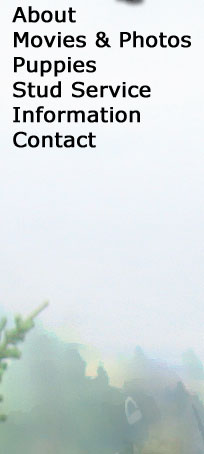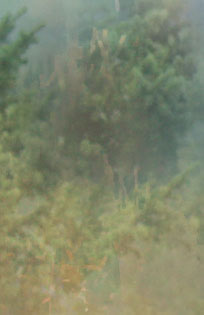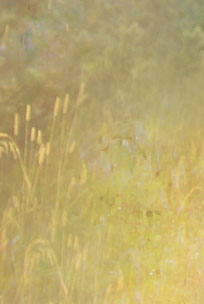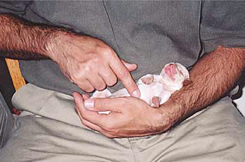   |
Socialization to Encourage High Performing Dogs
By Carla Simon
One of the most important things we do as breeders is to pay individual attention to each of the puppies we raise. A dog’s attitude toward new situations, and towards learning in general, is shaped during its youth.
As Carmen Battaglia commented “Generally genetics account for about 35% of the performance but the remaining 65% (management, training, nutrition) can make the difference…. In other words, it’s what they are able to do with what they have that makes the difference”. but the remaining 65% (management, training, nutrition) can make the difference…. In other words, it’s what they are able to do with what they have that makes the difference”.
I do as much socialization and early fun training as I can possibly fit in during the time puppies live in my home. This gets the pups off to the best start possible. But the job doesn’t end when the pup leaves its breeder; it’s only just begun! Below are some socialization guidelines for all dog owners.
Early Neurological Stimulation (3 to 16 days old)
Handle puppies individually, perform 5 exercises, each for 3-5 seconds maximum:
•Stimulate between toes with cutip
•Head held up
•Head held down
•Lying on back
•Lye on legs on top of damp towel cooled in fridge for 5 minutes.
Socialization (4 to 16 weeks old)
Expose the puppy to positive social contact, opportunities to explore and interact independently of its mother, owner, and littermates, so that they’re comfortable with everything and nothing seems scary.
•Trips away from home environment
•Introduction to household activity: dinnertime at the table, vacuum cleaner, blender, coffee grinder, music, TV, whistles, exercise bike, taking pictures, yelling, and quiet
•Wearing various collars (string at first, then buckle collar)
•Grab puppy's collar, surprise with playful tap on the rear when he's not looking; hugs and kisses; puppy held and carried arms, head up, head down; sitting on knee (prepare the puppy for children and surprising things they might do)
•Start crate training (the litter sleeps together in a large crate); confinement in x-pen
•Start house training (with "potty" outside)
•Introduce “strangers”: male, female, adult, teens, young children, strollers, elderly, big hats, kisses and hugs, people using walker, wheelchair, cane, crutches, ties & clipboard, opening umbrellas
•Handle all parts of the body with tail tugs, "pinch" fold of skin, squeeze paws, pull tail, nail clipping, brushing, teeth brushing, bath
•Introduce other dogs: males, females, different ages, colors, breeds
•Play outside in safe area e.g. exercise pen or fenced yard, with other dogs and strange humans, begin walking on leash and off leash with the pack (to encourage recall, and to learn from elder dogs)
•Play in the kiddie pool
•Introduce to other animals e.g. cats, horses, cows etc.
•Play with game birds (we don't mind if they chase the birds at this point, we're trying to introduce the scent & get them interested and excited)
•Play fetch and retrieve (with all types of objects including metal), chase, roughhousing, all sorts of safe toys e.g. biscuit balls, Kongs
•Give up food and toys, taking food treats gently
•Play on (pieces of) agility and obedience equipment (e.g. tunnel, ladder) and walking on different surfaces e.g. metal, bubble wrap, shifting table top, places to hide (makes the pups more adventurous & confident in the field and in life)
•Unstable surfaces e.g. netting, Bosu balance trainer, teeter, a-frame, and jump poles ling on ground, bridges, gravel, streams
•Retrieve all sorts of objects, including metal
•Begin show stacking
•Ride in the car, through car wash
•Introduce to clicker, attention and lured sit
•Offer individual attention away from littermates
•Fire a cap gun at meals and a variety or rewards
•Falling books and chairs; and playing sound effects CD's to get puppies used to a variety of strange, loud noises e.g. thunder, horse whinnies & snorts, crowds, fire engine pass, baby crying, baby laughing, fireworks, fire alarm, etc.
•Preliminary recall with food and encouragement
Enrichment (no time limit, longer period of time)
Enrichment experiences involve exposure to a wider variety of interesting, novel, and exciting experiences with regular opportunities to freely investigate, manipulate, and interact with them.
•Exposure to different environments e.g. pubic transit, outside parking lot of busy mall e.g. Wall-Mart store
•Trips to the park, out of doors, puppy kindergarten classes, attend agility trials and shows, beginner obedience classes when ready
•Play with variety of toys including chase, retrieve, tug, fetch.
I can't stress enough how important it is that you attend puppy kindergarten and expose your young dog to as many positive situations as possible. Don't miss the opportunity to socialize your puppy, and help your dog to achieve its potential.
|




 but the remaining 65% (management, training, nutrition) can make the difference…. In other words, it’s what they are able to do with what they have that makes the difference”.
but the remaining 65% (management, training, nutrition) can make the difference…. In other words, it’s what they are able to do with what they have that makes the difference”.